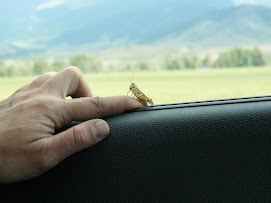Here is an article from BBC news on Bosnia. It wouldn't let me post it directly to the blog from the website, so I'm copying and pasting the text and pictures. It's by Paul Moss.
"Bosnia echos to alarming rhetoric"
They may have disagreed about politics, but the group of 20-something friends who had gathered for an after-work drink were all certain about one thing - they were Serbs.
"My father is a Serb, my grandfather is a Serb, I am a Serb. This is my nationality," said Vladislav.
"If we are looking at a football game," added Bane, "Serbia against somebody else, we are fans of Serbia."
These would not have been particularly notable declarations of identity, save for one crucial fact.
We were speaking in Banja Luka, a city in Bosnia, and all these people were Bosnian citizens.
But that meant little to Ivana, a trainee architect: "Bosnia is an artificial and silly creation, we naturally belong with Serbs," she said.
That "creation" was born out of the ruins of battle.
Everybody should be worried, this is the Balkans, and nationalist rhetoric here always leads to war
Svetlana Cenic, writer
At the end of the Bosnian Civil War, it was agreed that the country would remain a single nation.
However, the Serbs were granted their own officially-recognised region, known as the Republika Srpska.
It has its own parliament, and a fair degree of autonomy.
But now some fear this delicate constitutional compromise could be falling apart.
'Thinly-veiled threats'
The Republika Srpska parliament has issued a declaration, insisting that it has the right to make its own rules in certain key areas, like immigration and customs.
Milorad Dodik has hinted that he wants Republika Srpska to secede
That move was vetoed this week by Bosnia's High Representative, the internationally-appointed figure who still has executive authority in the country.
But the resulting row has left many worried about the country's stability.
"The way the Serb politicians speak is getting more and more nationalistic," says Svetlana Cenic, a writer and newspaper columnist.
"Everybody should be worried," she warns. "This is the Balkans, and nationalist rhetoric here always leads to war."
Svetlana and others are particularly alarmed by the pronouncements of the Bosnian Serb Prime Minister, Milorad Dodik.
He has made thinly-veiled threats that the Republika Srpska might secede from Bosnia altogether.
Any attempt at secession by the Republika Srpska would be seriously destabilising.
It would alarm the many ethnic Croats who still live in the region, as well as the Muslim population, known as Bosniaks.
It might also tempt the Croat region of Bosnia to contemplate a similar move towards independence.
But more than anything, secession would be resisted by the remaining part of Bosnia, with its capital in Sarajevo.
Hundreds of thousands of non-Serbs now live there, having been driven out of what is now the Republika Srpska during the Civil War.
'Betrayed'
And for those who remember this experience, like the actress Alena Dzebo-heco, independence for the Republika Srpska would be a moral outrage.
"The people who did the ethnic cleansing, they would get what they wanted," she argues.
"After everything my family went through - my uncle was in a concentration camp, my father was arrested.
"We would feel betrayed."
The ruling party in the Republika Srpska, the SNSD, has been playing down fears that it plans to secede - at least any time soon.
The speaker of the parliament, Igor Radojicic, said Mr Dodik, his party leader, was only responding to threats from Bosniaks.
He argues that they would like to take away the Republika Srpska's powers, and rule the whole of Bosnia directly.
"The fact is that Serbs are a minority in Bosnia, approximately one-third.
"There are fears that the Muslims might make decisions in favour of their ethnic group. So we are fighting to protect our autonomy."
There is certainly plenty of fear in the Republika Srpska that Muslims pose a threat.
They range from the kind of sober political argument advanced by the Parliamentary Speaker, to more lurid anxieties, whipped up in part by sensationalist newspapers.
"Osama Bin Laden has operations in Sarajevo," one well-educated man told me.
Others insisted that the Serbs were in the vanguard of the struggle against Islamic fundamentalism - this despite the fact that Bosnian Muslims tend to be relatively non-observant.
It is 17 years since the Bosnian Civil War began, sparked off by each different ethnic group believing that the others were trying to take over, and that they had to fight back.
The risk is that these fears, and the inflammatory rhetoric that tends to drive them, may be gaining ground once again.



